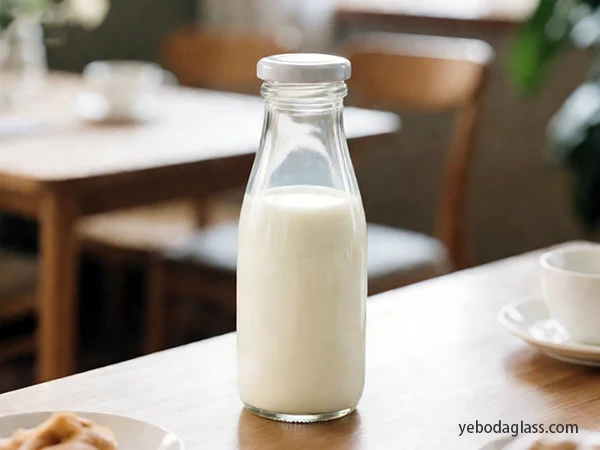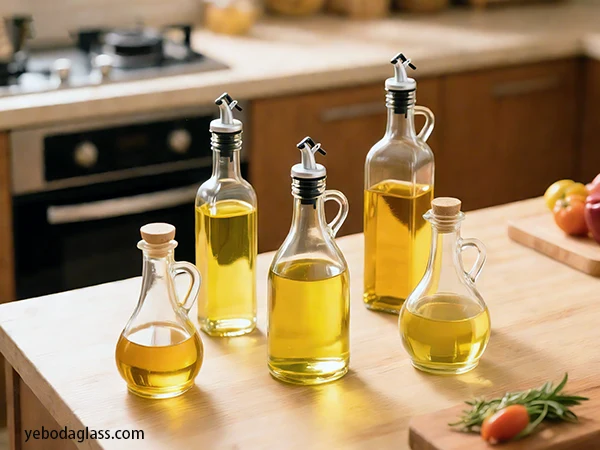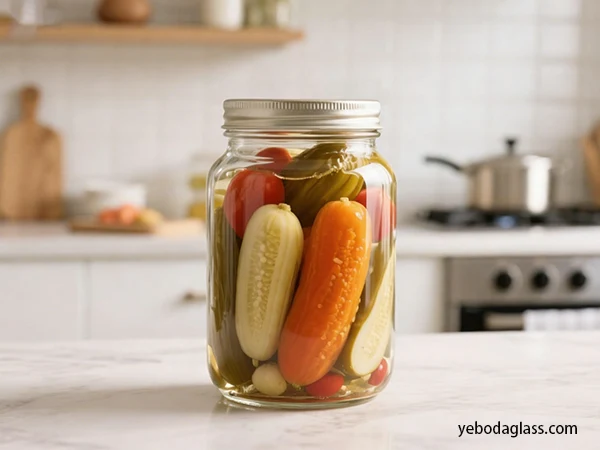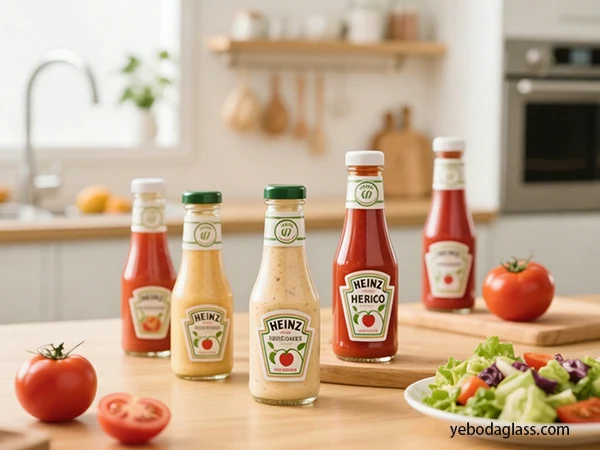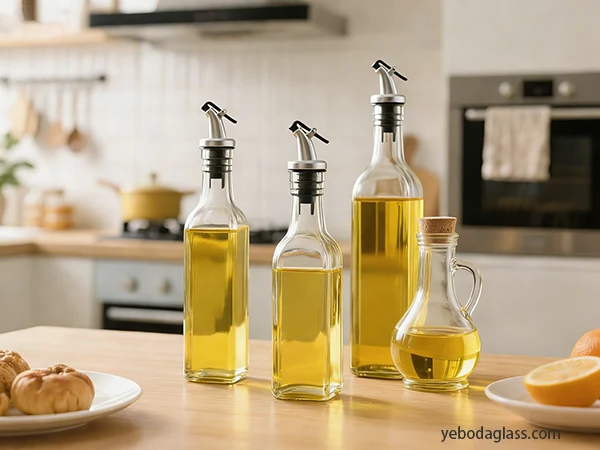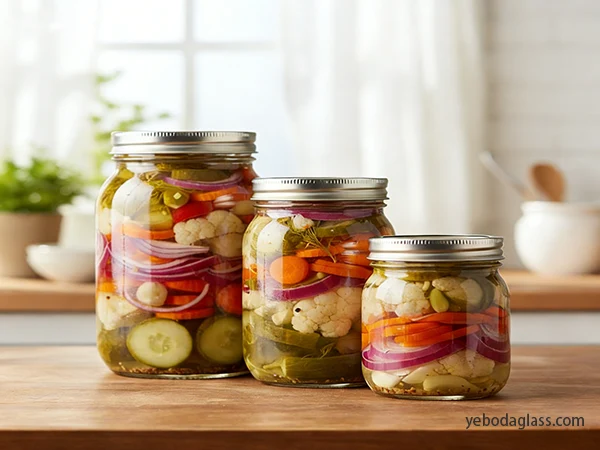Inleiding
De wereldwijde markt voor jampotten en jamflessen groeit gestaag, gedreven door de toenemende interesse van consumenten in zelfgemaakte, ambachtelijke en hoogwaardige voedselverpakkingen. Binnen de verschillende verpakkingsvormen blijft de glazen jamfles de gouden standaard, omdat deze duurzaamheid, optimale bescherming en een aantrekkelijk uiterlijk combineert. Het glas beschermt de versheid van de jam en straalt tegelijkertijd premium kwaliteit uit. Yeboda Het voordeel van jamflessen is dat ze voedselveiligheid combineren met aantrekkelijke merkmogelijkheden. De gladde oppervlakken maken veelzijdige etikettering mogelijk, terwijl de gestandaardiseerde afmetingen ze compatibel maken met automatische vul- en sluitmachines, wat de kosten voor massaproductie verlaagt.
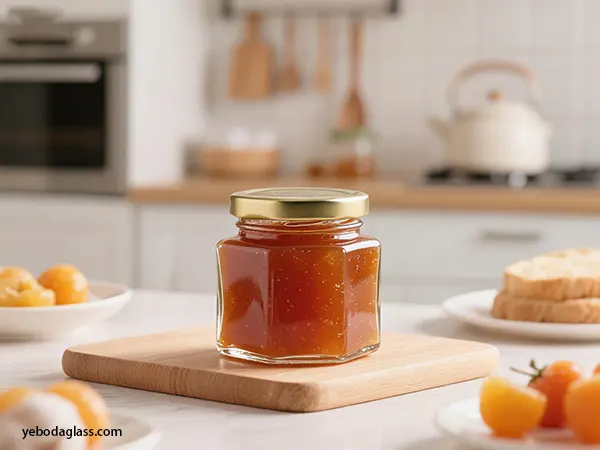
Marktdynamiek
Vraagfactoren
Jamfles De markt wordt beïnvloed door verschillende onderling verbonden factoren. Ten eerste verschuift de voorkeur van de consument naar authentieke, conserveringsmiddelvrije jam verpakt in transparante glazen jampotten om de natuurlijke kleuren en texturen te benadrukken. Ten tweede heeft de wereldwijde opkomst van de cadeaucultuur de jampot tot een gewild presentatieobject gemaakt voor feestelijke gelegenheden, bruiloften en seizoensgebonden promotiecampagnes. Het Yeboda jamflesmodel biedt consistente transparantie die aan deze behoeften voldoet, waardoor producten er aantrekkelijk uitzien in schappen en online. Deze visuele meerwaarde is een bewezen vraagstimulator in voedingsmiddelen met hoge marges.
Toeleveringsketen en logistiek
Aan de aanbodzijde speelt logistieke efficiëntie een belangrijke rol. Glazen flessen Gerecyclede glazen jamflessen zijn zwaarder en kwetsbaarder dan plastic varianten en vereisen speciale behandeling. Gerecyclede glazen jamflessen zijn echter beter geschikt voor regelgevende instanties en detailhandelaren die waarde hechten aan stabiliteit. Fabrikanten passen steeds vaker lichtere glastechnieken toe om een balans te vinden tussen sterkte en transportefficiëntie. Bovendien wordt de samenwerking tussen flessenleveranciers en jamproducenten steeds sterker, omdat de gezamenlijke ontwikkeling ervoor zorgt dat de verpakking aansluit op de vulspecificaties. Deze afstemming vermindert stilstand en helpt de kosten in de concurrerende markt te beheersen.
Prijsstructuren
De prijsconcurrentie in de jampottenindustrie hangt af van de bestelhoeveelheid, de grondstoffen en de complexiteit van het ontwerp. Glazen jampotten met reliëf of een aangepaste vorm hebben hoge productiekosten, maar bieden een unieke merkonderscheiding. Marktleiders hanteren een hybride strategie: gestandaardiseerde potten voor de gangbare markt, terwijl er speciale ontwerpen worden gemaakt voor premium jammerken.
Consumententrends
Ga voor natuurlijke en biologische producten.
Moderne consumenten hechten veel waarde aan natuurlijke ingrediënten en transparante verpakkingen. Doorzichtige glazen jampotten stralen authenticiteit uit, versterken de betrouwbaarheid van een merk en tonen direct het product. In Europa en Noord-Amerika is de verkoop van biologische jam jaarlijks met 8-10% gestegen, wat de vraag naar duurzame verpakkingsoplossingen vergroot.
Opkomst van kleine bedrijven en ambachtelijke telers
Ambachtelijke jamproducenten, boerenmarkten en lokale coöperaties geven de voorkeur aan glazen jamflessen vanwege hun herbruikbaarheid en de luxe uitstraling die ze creëren. Deze kleine producenten kiezen vaak voor compacte flessen die aansluiten bij de trend van geschenkverpakkingen. De veelzijdigheid van de Yeboda jamflessen maakt ze bijzonder aantrekkelijk voor dergelijke bedrijven, omdat ze flexibele bestellingen met een constante kwaliteit mogelijk maken.
Verpakkingen voor e-commerce en directe verkoop aan de consument
Met de snelle groei van online voedselverkoop is de duurzaamheid van de verpakking van groot belang geworden. Een jampot moet transport over lange afstanden kunnen doorstaan zonder te breken en er tegelijkertijd aantrekkelijk uit blijven zien. Om de klanttevredenheid te garanderen, worden beschermende hoezen en innovatieve secundaire verpakkingen gecombineerd met glazen jampotten. De balans tussen veiligheid en presentatie wordt een concurrentievoordeel.
Materiaalinnovatie in de constructie van jamflessen
Glas als premium standaard
Glazen jamflessen domineren de verpakking vanwege hun superieure barrière-eigenschappen tegen zuurstof en vocht, wat belangrijk is voor een langere houdbaarheid. Amberkleurige glazen jamflessen winnen aan populariteit omdat ze gevoelig fruit beschermen tegen UV-straling, waardoor zowel de productveiligheid als het smaakbehoud worden verbeterd.
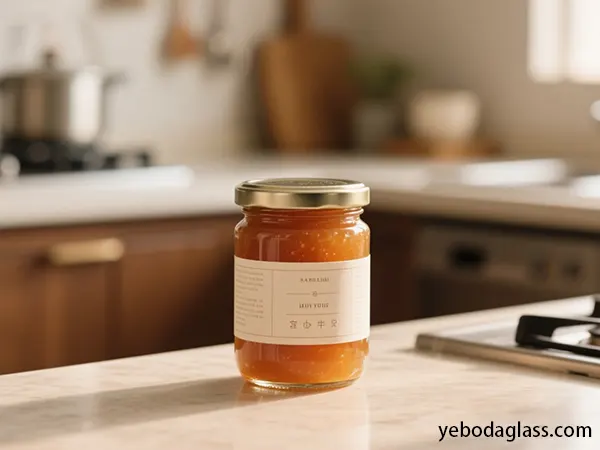
biologisch afbreekbare en hybride opties
Hoewel er plastic alternatieven bestaan, is er door toenemende milieuoverwegingen een voorkeur ontstaan voor biologisch afbreekbare polymeren en hybride verpakkingen. Het recyclen van glazen jampotten biedt echter nog steeds een stabielere werking dan composteerbaar plastic, dat problemen kan opleveren bij grootschalige verwerking.
Gewichtsvermindering en energie-efficiëntie
Fabrikanten investeren in lichtgewicht glastechnologie om de verzendkosten en CO2-uitstoot te verlagen. Elke gewichtsvermindering van het glas met 10% leidt doorgaans tot een energiebesparing van ongeveer 3% tijdens de productie. Naarmate de vraag naar milieuvriendelijke jamverpakkingen toeneemt, zullen dergelijke innovaties noodzakelijk zijn om aan de verwachtingen van regelgevende instanties en consumenten te voldoen.
Pak Resultaten van Jam Flesverpakking
Houdbaarheid en conservering
De keuze van jampotten heeft direct invloed op de productbescherming. Glazen jampotten vormen een ondoordringbare barrière, verminderen oxidatie en behouden de smaak van het fruit. In vergelijking met plastic potten behoudt glas de kleur en het aroma beter, zelfs bij langere bewaartijden. Onderzoek wijst uit dat jam bewaard in amberkleurige glazen potten tot 30% van de antioxidantactiviteit behoudt in vergelijking met jam in transparante plastic potten, wat de betere conserverende eigenschappen van het materiaal aantoont.
Pak Creativiteit
Verpakking beïnvloedt ook de culinaire perceptie. Wanneer consumenten de ambachtelijke producten in transparante jampotten zien, associëren ze het product met authenticiteit en vakmanschap. Prestigieuze restaurants en boetiekrestaurants geven de voorkeur aan glazen jampotten voor snelle bediening aan tafel, omdat dit de presentatie verbetert en de klantbeleving versterkt. Verpakking draagt dus niet alleen bij aan de bewaring, maar vertelt ook het verhaal van het product.
Portiecontrole en serveren
Kleine glazen potjes jam zijn populair vanwege hun hygiënische eigenschappen en het handige formaat voor eenmalig gebruik in de horeca, zoals bij luchtvaartmaatschappijen, hotels en cateringbedrijven. Ze verminderen voedselverspilling, maken eenvoudige controle per portie mogelijk en geven een gevoel van exclusiviteit. Deze meerwaarde is een belangrijke factor geworden in B2B-leveringscontracten voor horecagroepen.
Gezondheids- en welzijnsbenadering
Veiligheid en chemische economie
Glas is chemisch passief, wat betekent dat het geen stoffen in voedsel aantast. Dit maakt glazen jam een aantrekkelijke optie voor gezondheidsbewuste consumenten. In tegenstelling tot sommige soorten plastic, zorgt glas ervoor dat de structuur, textuur, smaak en kleur behouden blijven, wat aansluit bij de toenemende vraag naar natuurlijke producten met een clean label.
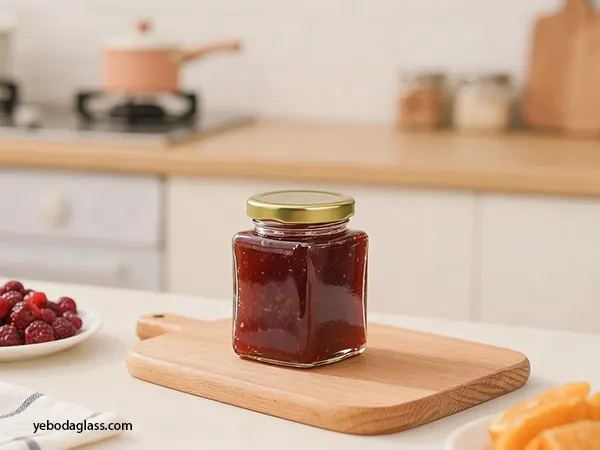
Voedingsintegriteit
Onderzoek wijst uit dat fruitproducten die in luchtdichte jampotten worden bewaard, een hoog gehalte aan vitamine C en polyfenolen behouden in vergelijking met alternatieve verpakkingsmaterialen. Dit is met name belangrijk voor biologische merken die zich richten op voedingsgerichte marketingstrategieën.
Hygiëne en hergebruik
Hergebruik draagt ook bij aan gezondheidsvoordelen. Glazen jampotten worden vaak hergebruikt voor het bewaren van voedsel, fermentatie of dranken thuis, waardoor het contact met wegwerpplastic wordt verminderd. Deze tweede levenscyclus vergroot het consumentenvertrouwen in glazen verpakkingen.
Duurzaamheid en milieu-impact
Voordelen van recycling
Een van de grootste voordelen van glazen jampotten is dat ze oneindig vaak gerecycled kunnen worden zonder kwaliteitsverlies. De energie die nodig is voor de productie van recyclingmachines verlaagt de kosten aanzienlijk en reduceert het energieverbruik van de ovens tot ongeveer 3% per 10% gerecycled materiaal. Gebieden met geavanceerde glasinzamelingssystemen behalen recyclingpercentages van meer dan 70%, wat de positie van glas als koploper in circulaire verpakkingen versterkt.
CO2-voetafdruk idee
Lichtgewichttechnologieën zijn belangrijk om de CO2-uitstoot bij het transport van glazen jampotten te verminderen. Grote fabrikanten gebruiken nu sterkere wanden, waardoor de transportemissies met 20% dalen. In combinatie met het gebruik van hernieuwbare energie in de glasproductie versterken deze maatregelen de stabiliteit.
Merkafstemming met groen consumentisme
Stabiliteit is niet langer een optie, maar een aankoopfactor. Merken die hun bescherming in glazen jamflessen verpakken, spreken milieubewuste consumenten effectiever aan. De visuele recycling van het glas vertegenwoordigt de perceptie van zelfreinigend, herbruikbaar en duurzaam – verantwoord consumeren.
Schoonheidsontwerp en branding
Visuele discriminatie
Het ontwerp speelt een cruciale rol in de aantrekkingskracht op de consument. Jampotten met reliëf, aangepaste vormen en gestructureerde oppervlakken zorgen voor een unieke uitstraling en vergroten de merkherkenning. Glas biedt ongeëvenaarde flexibiliteit voor optimale prestaties in vergelijking met plastic.
Etikettering en decoratie
Gladde oppervlakken op glazen jampotten lenen zich voor geavanceerde etiketteringstechnieken, van krimpfolie tot zeefdruk. Hoogwaardige afwerkingen zoals roestbruin glas of een metalen dop zorgen voor een aantrekkelijk schapeffect. In het tijdperk van sociale media marketing is een fotogenieke verpakking een concurrentievoordeel.
Culturele en regionale identiteit
Verpakkingsontwerp weerspiegelt vaak het regionale erfgoed. Zo leggen mediterrane merken de nadruk op rustieke ontwerpen, terwijl producenten uit Noord-Europa minimalisme omarmen. Glazen jampotten bieden de mogelijkheid om dit culturele verhaal via vorm en decoratie tot uiting te laten komen, wat de klantloyaliteit vergroot.
Uitdagingen en marktbelemmeringen
Kosten en productiecomplexiteit
De productie van glas vereist een aanzienlijke energie-input, waardoor jampotten duurder zijn dan plastic verpakkingen. Ook de instabiliteit van grondstof- en energiekosten beïnvloedt de prijsvorming. Kleine producenten kunnen financiële problemen ondervinden bij de overstap naar hoogwaardige glazen verpakkingen.
Logistiek en finesse
De kwetsbaarheid van glazen jampotten vormt een constante uitdaging voor de toeleveringsketen. Breukkosten en de CO2-uitstoot tijdens transport dragen hieraan bij. Om dit te verminderen, worden beschermende verpakkingen, verstevigde pallets en slimme magazijnbehandelingssystemen ingezet.
Concurrerende alternatieven
Hoewel glas het premiumsegment domineert, blijven PET- en biobased plastic verpakkingen voor jam in de massamarkt sterke concurrenten. Innovaties in PET-potten met wanden van hoge kwaliteit proberen de uitstraling van glas tegen lage kosten na te bootsen. Het premiumsegment van glas heeft echter een symbolische waarde voor authenticiteit.
ROI en strategische overwegingen
Rendement op investering voor merken
Investeringen in hoogwaardige glazen jampotten leiden vaak tot een hoge winstmarge, omdat consumenten bereid zijn meer te betalen voor ambachtelijk vervaardigde verpakkingen. Casestudies tonen aan dat de gemiddelde verkoopprijs per pot bij de overstap van plastic naar glas met 15-20% is gestegen, wat het merkimago ten goede komt.
Marktstatus op lange termijn
Het gebruik van glazen verpakkingen ondersteunt een langetermijnpositie als een permanent premiummerk. Het schept geloofwaardigheid in concurrerende markten, met name in Europa en Noord-Amerika, waar regelgeving en consumentenverwachtingen sterk de voorkeur geven aan gerecyclede materialen.
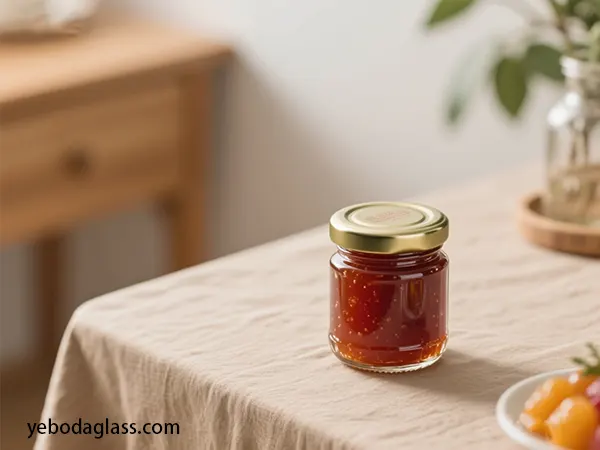
Conclusie
De jam-industrie ondergaat snelle veranderingen, waarbij glas steeds meer wordt gezien als een hoogwaardig, duurzaam en gezondheidsbewust verpakkingsmateriaal. Hoewel uitdagingen zoals logistiek en kosten blijven bestaan, blijven de voordelen van glazen jam-potten – van de conserveringskwaliteit tot de mogelijkheden voor branding – de vraag ernaar aanhouden. Voor bedrijven is de beslissing om glazen verpakkingen te gebruiken of uit te breiden niet alleen een kwestie van verpakkingskeuze, maar een strategische investering die aansluit bij de trends op het gebied van merkbekendheid, consumentenvertrouwen en wereldwijde stabiliteit.

